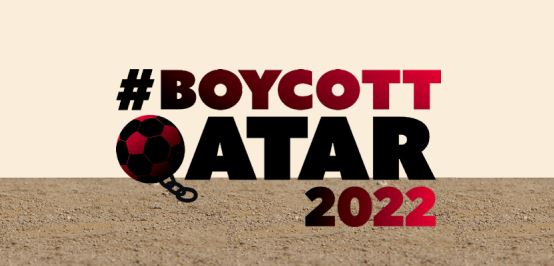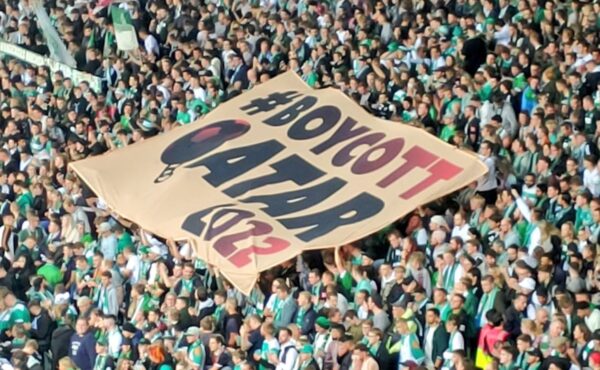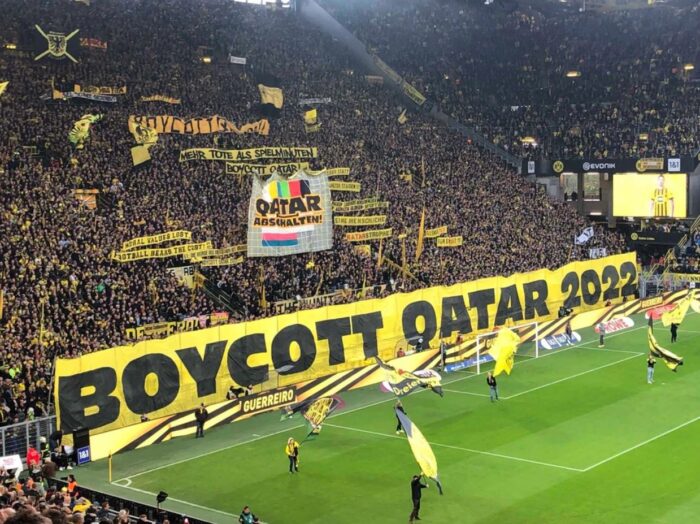#BoycottQatar - Together against the World Cup

Using the hashtag BoycottQatar, soccer fans and human rights activists are calling for a boycott of the 2022 World Cup. The initiative wants the German Football Association (DFB) to take a firm stand against corruption, violations of human rights, and finally against the lack of a strong soccer culture in the host country.
We have spoken with Bernd Beyer, one of the initiators of #BoycottQatar2022, about Qatar and about why the protest against this World Cup needs broad support just now.
What motivated you to launch Boycott Qatar? What are your goals?
Firstly, reports about the living and working conditions of migrant workers in Qatar were a factor that motivated us, and secondly our taking a closer look at the political and social situation in the country ourselves. We have come to the conclusion that FIFA was wrong to hold the World Cup in this country.
Our goal is to ensure that any future host country awarded the tournament will have to observe human rights and sustainability standards. This applies to the world of football all the more as here many things have been going wrong for a long time unfortunately. If our protest also helps the work of human rights organizations, we will be happy.


The call for boycott
#BoycottQatar2022: using this hashtag, soccer fans and clubs are criticizing violations of human rights in the country hosting the World Cup, the shameful working conditions of migrant workers, the lack of soccer culture in Qatar, and the commercialization of sport. The initiators are calling for the German Football Association to take a firm stand against the World Cup in Qatar and are appealing to the (German) public to abstain from watching the games and from buying any products with the World Cup logo.
How can we ensure that the process for selecting the World Cup host country is improved in the long term?
This can only be achieved through pressure from the national associations, such as the DFB within FIFA. That is to say that the criteria for awarding tournaments must be changed, and the awarding process must be made transparent. External groups, NGOs, and international trade unions should oversee the process.
What do you tell people who argue that football is no place for politics?
The two things cannot be separated! Of course, every country that hosts the World Cup pursues a political agenda. Germany did that in 2006 and will do it again at the European Championship in 2024. If this agenda is compatible with the values of sport (fairness in a broad sense, which implies the validity of human rights), no one will raise any objections. If the host agenda violates these values and whitewashes abuses in the country, though, this must be criticized, by not doing so, we would be part of the charade.
Why do you think that this World Cup in Qatar must be boycotted? Why not the last World Cup or the one before that?
Boycott is a very intense form of protest that should be sought only when, as with Qatar, many red lines have been crossed.
From today’s perspective, we believe that a boycott should have been considered for the World Cup in Russia as well. Whether this boycott would have resulted in a strong movement is another matter. During the World Cup season in South Africa (2010) and in Brazil (2014), there were social upheavals and protests, which were discussed and supported by German groups.
»It is essential for the fans to look at the situation in Qatar, to confront FIFA’s policies and say: “This kind of soccer is not our kind of soccer!«
Bernd Beyer, #BoycottQatar
Numerous organizations confirm that the major public debate on human rights in Qatar has resulted in improvements for migrant workers, for example. Do you agree with this assessment?
There have been some formal improvements in working conditions, and actual improvements for a small number of workers, but the majority of migrant workers are still exposed to unacceptable conditions. Protests against these conditions are suppressed by force. Migrant workers are not allowed to form trade unions. According to assessments by Amnesty International and Human Rights Watch, the situation has become much worse again, particularly in the last twelve months.
Are you hopeful that the potential improvements will be maintained in the long run, even after the World Cup when the public no longer looks to Qatar?
It is to be feared that some things will be taken back. On the other hand, Qatar continues to seek to host major sporting events such as the 2032 Olympics, knowing that this will bring the country back into the international spotlight. The World Cup is just one part of Qatar’s sports-washing strategy, which the country’s government is using to polish up its image. The intention is for big sporting events to divert public attention from the undemocratic regime, violations of human rights, and religious fundamentalism in the country.
Why is it important for soccer fans here in Germany to boycott the World Cup? What does this change?
It is essential for the fans to look at the situation in Qatar, confront FIFA’s policies and say: “We refuse to be part of a spectacle that is designed to whitewash Qatar and, above all, to make FIFA money.” This kind of soccer is not our kind of soccer!”
We can’t protest against all the developments that damage professional soccer, but we have to stand up now and then. Specifically, our rejection of this tournament is intended to make it clear to FIFA and its sponsors that it does not pay to award tournaments to countries like Qatar. For this to happen, not only will the viewer ratings have to go down, but also the revenues of the companies that sponsor this World Cup and sell products with the World Cup logo. When advertising partners realize that they cannot profit financially from the World Cup, they will put pressure on FIFA. People who voice criticism beforehand and then watch every game – possibly in a party mood at a public viewing – achieve nothing!

